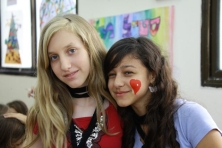New Global Education: Social Skills

The current state of today’s youth reflects the reality of the 21st century. On the surface, our youngsters may appear superficial, indifferent, lost in a virtual realm of smartphones and tablets, but the truth of the matter is that they are far more developed than we are. It is a generation that lives and breathes in a connected, fast, and integral world where political borders do not exist, and where all are citizens of a global sphere.
If we look into their hearts, we will discover an entire generation that does not settle for following the safe route of college, career, children, but seeks to know “What for?”. They wish to understand their role in the world and the type of connections they must establish to obtain happiness. This is why they are defiant toward the schooling systems we have built. It is not lifeless information that they need; they need education in the fullest sense of the word.
The educational agenda of the 21st century need not be force-feeding information into youths. Rather, it should provide social skills that help them overcome alienation and mistrust that abound in today’s society. To make the youth an active force in initiating social change, we must help them understand the laws of the new world. Even more important, we must help them see what they can do to use these laws to their favor.
In their unique way, today’s youngsters are compelling us—the generation of the old world—to realize that the world has changed and that we must rethink our position in it.



